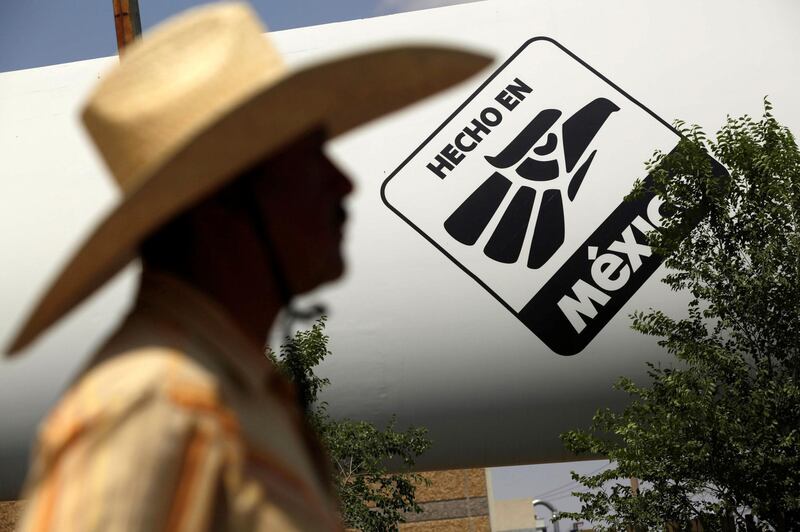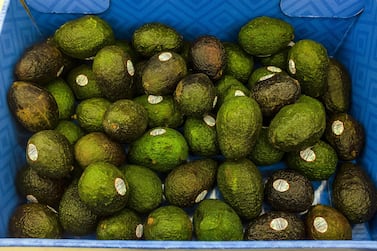US President Donald Trump’s vow to impose tariffs on all goods made in Mexico will be a blow to major hardware technology companies already reeling from the US-China trade war.
Dell, HP and Hewlett Packard Enterprise are among the US technology companies that manufacture products in Mexico. Computers and printers made by these companies and imported into the US from Mexico would face a 5 per cent levy starting June 10, according to Mr Trump’s decree. The White House said Thursday that the tariffs would rise as high as 25 per cent in October if Mexico doesn’t stop the flow of migrants and asylum-seekers across the US southern border.
The US imported $25 billion (Dh91.81bn) worth of computers from Mexico in 2018, according to the US Census Bureau, and $2.5bn in computer accessories. Hardware giants that have relied more on Mexican production the past two decades to take advantage of the North American Free Trade Agreement are now facing whiplash. They have already been forced to reconfigure their supply chains to contend with American duties imposed by Mr Trump on products made in China.
For Dell, Mexico was a safe harbor to escape from the worst impacts of the US-China trade conflict. The Round Rock, Texas-based company reallocated some desktop computer production to Mexico from China months ago in response to US levies. The company also makes servers in Mexico. Now, it’s trying to figure out how to deal with the potential new tariffs.
“We are big believers in free trade,” Dell spokesman Steve Gilmore said Friday in a statement. “One possibility, if this tariff goes through, is that we’ll have to raise prices. The good news is we have a global, flexible supply chain with more than 25 production facilities. This is an advantage for us that allows us to pivot very quickly and minimise impact to customers the best we can.”
HP manufactures some personal computers and printers in Mexico. The company said its “diverse” global supply chain would help reduce the risks of the tariffs.
“We share industry concerns that broad-based tariffs are putting consumers on the front lines of a trade war by increasing the cost of electronics,” an HP spokesman said. “We are actively monitoring the situation and will continue to work with the U.S. administration to advocate for the best interests of customers, partners and consumers.”
Hewlett Packard Enterprise, a server maker that split from HP in 2015, also is girding itself for the new US import duties. A tariff on goods made in Mexico would have a worse financial effect on HPE than the levies on goods made in China, according to a person familiar with the matter who asked not to be identified. HPE also assembles some products in the US and depends on a unified North American supply chain, the person said.
HPE expects the duties to be detrimental to the computer industry and the US economy, according to the person, who wasn’t authorised to speak publicly about the issue. The current trade environment is untenable for global companies, which may have to allocate fewer resources to research-and-development and other investments that fuel US innovation, the person said.
In a statement, HPE said, “We continue to believe an open market is best, but we are confident that we can leverage our diversified global supply chain to mitigate the impact from changes in global trade.”
Many major technology firms rely heavily on other companies to manufacture their products, including Florida-based Jabil and Flex, based in San Jose, California. Both of these contract manufacturers have operations in Mexico.
Those companies make products from mobile phones to servers and have extensive customers lists, including Apple, Cisco, Microsoft and the personal computer makers. Jabil’s Guadalajara facility operates 363,000 square feet of manufacturing space and makes networking infrastructure, wireless and telecommunications gear.
Jabil is Cisco’s biggest supplier, according to supply chain data compiled by Bloomberg. Earlier this month, Cisco chief executive Chuck Robbins said his company has done extensive work to mitigate the impact of US tariffs on gear made in the China by shifting production elsewhere.
Apple, one of the world’s largest sellers of technology products, lists three suppliers with ties to Mexico on its list of top component sources: Kemet Corp, Skyworks Solutions, and CCL Design. All three companies make components for Apple that go inside its devices, with Skyworks having long been a key supplier of wireless components.
The companies also have manufacturing outside of Mexico, including in Asia, and it’s unclear if Apple actually sources any of their components directly from Mexico.
Other World Computing, a maker of computer storage components, is another company that shifted production from Asia to Mexico. Now the closely held firm, which has annual sales of $125m, is longing for a predictable business environment. Founder and chief executive Larry O’Connor said Mr Trump’s announcement was a “kick in the gut”.
“China I get, but I don’t know what the endgame of this is,” Mr O’Connor said in an interview. “These trade issues are great sound bites for a certain base, but damaging for the folks who have to deal with it. It has the high risk of pushing jobs away from the US and North America.”
Mr O’Connor said the new duties could fray trade relationships that support jobs on both sides of the US-Mexico border, and the US supply chain isn’t yet robust enough to make his products domestically. The company may have to boost prices for individuals and companies that want to upgrade the storage or speed of their Mac computers. In the long term, Other World Computing will look for production locations that aren’t vulnerable to tariffs, he said.
Lenovo, a Chinese PC and server company, has multiple production lines in Mexico. The company has gained enough market share to become the world’s largest PC maker in part by offering low prices - a strategy that will be tested when Mr Trump’s new duties go into effect.








